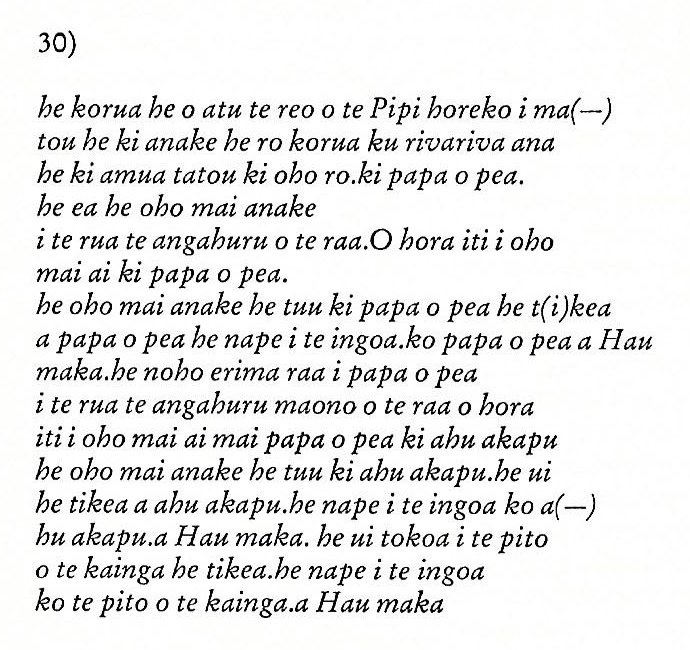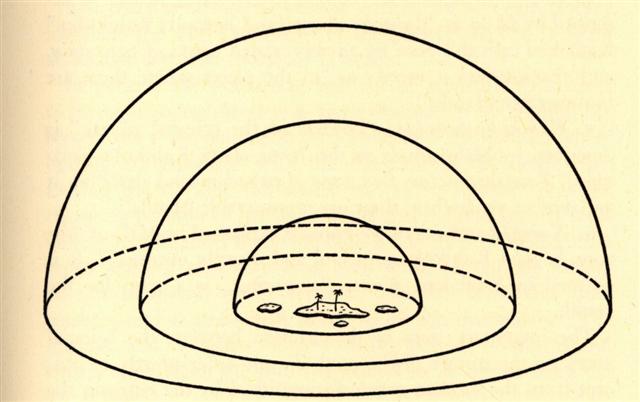
|
he noho erua
te angahuru mahitu te raa i oro(-) |
They
stayed twenty-seven days in
Oromanga. Every time Kuukuu asked,
'Where are you, friends' they
immediately replied [hakahoki]
in one voice [reo] 'Here we
are!'. |
|
manga.ai
ka ui no mai a kuukuu he korua |
| e nga koe e. ai
ka hakahoki no mai te reo anake |
| i matou. |
| he noho anake he
hakatopa i te ki. he topa te ki |
They all
sat down and thought. They had an
idea, and Ira spoke, 'Hey, you! [he
ro korua] Bring [ka too] the
round stones (from the shore) and
pile them into six [ono]
heaps of stone!' One of the youths
[te tahi ngaio] said to Ira,
'Why [ka aha] do we want to
do that?'
Ira replied, 'So that we can all
ask the stones to do something.' |
| amua.he ki a
Ira.he ro korua e ka too mai te |
|
pureva
ki hakatuutuu kia ono
pipi horeko |
| he ki mai te tahi
ngaio kia ira.ai ka aha tato(-) |
| u.he ki atu a
Ira.ai ka ui tatou ki te pipi |
| horeko. |
|
Pure.
Cowrie (Cypraea caput
draconis); pure vaka,
another type of cowrie, which can
float on the sea like a diminutive
boat (vaka). Vanaga. 1. To
pray, to supplicate, invocation,
prayer; hare pure, church,
chapel; tae pure,
irreverence; purega, prayer P
Pau., Mgv., Mq., Ta.: pure,
to pray. In Samoa, Tonga, Niuē,
Futuna, Uvea, pule
means to command. 2. A shell
T. P Pau.: hakapurepure, to
dye, to color. Mq.: pué, the
porcelain shell. Ta.: pure, a
mark. Purepure, spotted,
dappled; ragi purepure,
dappled sky. Purepurea,
spotted. P Pau.: hakapurepure,
to dye, to color. Mgv.: purepure,
printed cloth; akapurepure,
to paint in different colors. Mq.:
puépué, covered with pale
scars. Ta.: purepure,
spotted, dappled. Churchill.
Pureva, rock, stone
(small enough to be thrown by hand).
Vanaga.
Pureva, to throw a
stone. Ta.:
Pureva, to be on the eve
of going. Ha.:
puleva, to float here and
there. Churchill. Pau.: Pure-hiva,
a butterfly. Mgv.: pure-rehue,
id. Ta.: pure-hua, a moth.
Mq.: pure-hua, id. Ma.:
pure-hua, id. Churchill.
Pipi.
1. Bud, sprout; to bud,
to sprout; ku-pipi-á te tumu miro
tahiti, the trunk of the miro
tahiti has sprouted. 2. A small
shellfish, common on the coast.
Vanaga. 1. To blanch, to etiolate.
2. A spark, to sparkle. 3. Young
branches, shoot, sprout, to bud.
Mq.: pipi, tip of the banana
blossom. 4. Snail, T, pea, bean. P
Mgv.: pipi, small shellfish
in the shape of a mussel. Mq.:
pipi, generic term for shells.
Ta.: pipi, generic term for
beans. 5. To boil with hot stones.
6. A wave. 7. Thorn, spiny, uneven.
8. Small; haha pipi, small
mouth. 9. Rump, the rear. Pipine,
to be wavy, to undulate. Churchill.
Hore. (Hore,
horehore): to cut with a
knife or with an obsidian blade
(also: horea).
Horeko, solitary, lonely;
kona horeko, solitary place,
loneliness. Vanaga. To hew, to cut
off, to amputate, to castrate, to
cut with a knife, to decapitate, to
abridge, to incise, to set
landmarks; a notch, incision, tenon;
hore poto, to cut short off;
hore te gao, to chop the head
off. Churchill. |
| he too mai i te
pipi horeko he hakatuutuu |
They
took (the material) for the stone
heaps (pipi horeko) and piled
up six heaps of stones at the outer
edge of the cave [te ana].
Then they all said to the stone
heaps, 'Whenever he calls, whenever
he calls for us [kia matou],
let your voices rush (to him)
instead of the six (of us - i.e.,
the six stone heaps are supposed to
be substitutions for the youths)'.
They all drew back to profit
(from the deception) (? ki honui)
and listened [he hakarongo].
A short while later, Kuukuu called [he
ui mai era]. |
| eono pipi horeko
i te hihi o te ana.he ki ana(-) |
| ke.ki te pipi
horeko.ana ui mai ka ui mai |
| ena kia matou e
rere tokorua reo.ao ono |
|
he neke
mai anake ki
honui he hakarongo |
| atu.he ui mai a
kuukuu ka ui mai era |
|
... I remember
from somewhere in Heyerdahl's books
that he considered it significant
that neke-neke was a special
word in the vocabulary of Easter
Island, it meant 'walking without
legs, walking by moving the weight
this side and that slowly advancing
forward'. He had discovered the word
when he asked how the statues had
been moved - they walked (neke-neke)
was the answer ...
Honui. 1. Person worthy of
respect, person of authority. 2.
Livelihood, heirloom,
capital; ka moe koe ki toou
hônui, you must marry to ensure
your livelihood (said to a little
girl); he hônui mo taaku poki,
this is the heirloom for my son.
Vanaga. Great (hoonui);
honui, chief T.; tagata
hoonui, personage; hakahonui,
to praise, to commend. Churchill. |
|
E:30 |
|
he korua he o atu te reo o te
Pipi horeko i ma(-) |
As soon as he had asked, 'Where are
you?' the voices [te reo] of
the stone heaps [te Pipi horeko]
replied, 'Here we are!' All (the
youths) said [he ki anake],
'Hey you! That was well done!' |
|
tou he ki anake he ro korua ku
rivariva ana |
|
he ki amua tatou ki oho ro.ki
papa o pea. |
He (i.e., Ira) said, 'Let's go! We
shall go to Papa O Pea'. They all
got up [he ea] and moved on. |
|
he ea he oho mai anake. |
|
i te rua te
angahuru o te raa.O hora iti
i oho |
On the twentieth day of the month of
August ('Hora Iti') they went to
Papa O Pea. They all went and came
to Papa O Pea, looked around in Papa
O Pea, and gave the name 'Papa O Pea
A Hau Maka'.
They stayed five days in Papa O
Pea. |
|
mai ki ai ki papa o pea. |
|
he oho mai anake he tuu ki papa o
pea he t(i)kea |
|
a papa o pea
he nape i te
ingoa.ko papa o pea a Hau |
|
maka.he
noho erima raa
i papa o pea. |
|
i te rua te
angahuru maono o te raa o hora |
On the twenty-sixth day of the month
of August ('Hora Iti') they went
from Papa O Pea to Ahu Akapu. They
all went and reached Ahu Akapu.
They looked around and gave the name
'Ahu Akapu A Hau Maka'.
They also saw (all of) Te Pito O
Te Kainga, looked around, and
gave(the whole island) the name 'Te
Pito O Te Kainga A Hau Maka'. |
|
iti
i oho mai ai mai papa o pea ki ahu
akapu |
|
he oho mai anake he tuu ki ahu
akapu.he ui |
|
he tikea a ahu akapu.he
nape i te ingoa ko a(-) |
|
hu akapu.a
Hau maka. he ui tokoa i te
pito |
|
o te kainga he tikea.he
nape i te ingoa |
|
ko te pito
o te kainga.a Hau maka. |
|
Pito. 1. Umbilical cord;
navel; centre of something: te
pito o te henua, centre of the
world. Ana poreko te poki, ina
ekó rivariva mo uru ki roto ki te
hare o here'u i te poki; e-nanagi te
pito o te poki, ai ka-rivariva mo
uru ki roto ki te hare, when a
child is born one must not enter the
house immediately, for fear of
injuring the child (that is, by
breaking the taboo on a house where
birth takes place); only after the
umbilical cord has been severed can
one enter the house. 2. Also
something used for doing one's
buttons up (buttonhole?). Vanaga.
Navel. Churchill. H Piko 1.
Navel, navel string, umbilical cord.
Fig. blood relative, genitals. Cfr
piko pau 'iole, wai'olu.
Mō ka piko, moku ka piko, wehe i
ka piko, the navel cord is cut
[friendship between related persons
is broken; a relative is cast out of
a family]. Pehea kō piko? How
is your navel [a facetious greeting
avoided by some because of the
double meaning]? 2. Summit or top of
a hill or mountain; crest; crown of
the head; crown of the hat made on a
frame (pāpale pahu); tip of
the ear; end of a rope; border of a
land; center, as of a fishpond wall
or kōnane board; place where
a stem is attached to the leaf, as
of taro. 3. Short for alopiko.
I ka piko nō 'oe, lihaliha
(song), at the belly portion itself,
so very choice and fat. 4. A common
taro with many varieties, all with
the leaf blade indented at the base
up to the piko, junction of
blade and stem. 5. Design in
plaiting the hat called pāpale
'ie. 6. Bottom round of a
carrying net, kōkō. 7. Small
wauke rootlets from an old
plant. 8. Thatch above a door.
'Oki i ka piko, to cut this
thatch; fig. to dedicate a house.
Wehewehe. Kaiga. 1. Action
of eating; meal; nourishment
(katiga was the ancient word).
2. Ground; country; island. 3. Womb,
uterus (also matakao).
Vanaga. Land, country, place,
region, estate, soil; noho
kaiga, indigenous, a native of;
mau kaiga, proprietor;
hooa te kaiga, to buy
land. T Pau.: kaiga, the
soil. Mgv.: kaiga, land,
country, property, the earth, the
world. Mq.: kaina, kaika,
residence, property, patrimony. Ta.:
aiá, place of residence.
Churchill. |
Polynesians regarded their own island as the
center ('navel') of the whole:

|

